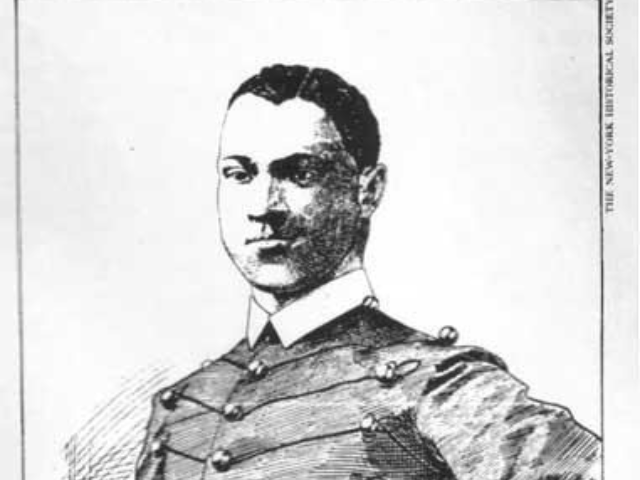
Cadet Johnson Chesnut Whittaker. Wikimedia Commons.
(1858-1931) Whittaker was born on the Camden plantation of James Chesnut, Sr. He was the son of Maria Whitaker, a slave, and James Whitaker, a free black man. Whittaker gained a congressional appointment to the United States Military Academy at West Point in 1876. At first, he roomed with West Point’s first black graduate, Henry O. Flipper. Whittaker lived a solitary existence, ostracized by the white cadets because of his race. On April 6, 1880, at reveille he was found unconscious on the floor in his room, his legs secured to the rails of his bed, his arms tied in front of him, his ear lobes slashed, and his hair gouged. He told West Point authorities that three masked men had attacked him during the night. A court of inquiry found him guilty of self-mutilation to avoid an examination two months in the future. To exonerate himself, Whittaker demanded a court-martial, which found him guilty again. The following year, the army’s judge advocate general threw out the decision on procedural and factual grounds. But Secretary of the Army Robert T. Lincoln (the son of Abraham Lincoln) expelled Whittaker from the academy anyway, based, he said, on Whittaker’s failure in an 1880 examination.
Whittaker became a teacher at Charleston’s Avery Institute. In 1885 he was admitted to the South Carolina Bar and practiced briefly in Sumter. He married Page Harrison in 1890, and they had two sons, one of whom, Miller F. Whittaker, became president of Orangeburg’s Colored Normal, Industrial, Agricultural and Mechanical College of South Carolina (which became South Carolina State University). During the 1890s Whittaker was principal of the first black school in Sumter, and from 1900 to 1908 he was principal of the academy at the Orangeburg black college. From 1908 to 1925 he served as teacher and principal at Douglass High School in Oklahoma City, where one of his students was the black novelist Ralph Ellison. Whittaker returned to Orangeburg in 1925 as teacher and administrator. He died in Orangeburg and was buried in the local black cemetery. In 1995, in a White House ceremony, President Bill Clinton awarded Whittaker a posthumous U.S. Army commission.


